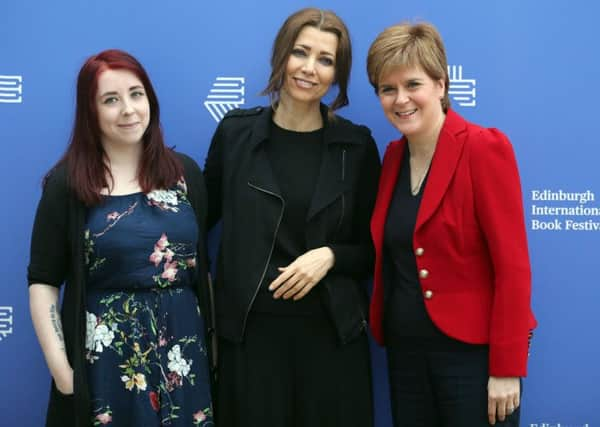Book Festival: Elif Shafak and Nicola Sturgeon on speaking from the heart


It was entirely fitting, then, that one of her guests was First Minister Nicola Sturgeon, along with Heather McDaid, one of the editors of Nasty Women, a new anthology of essays about womanhood in the 21st century. It was as if the three women were demonstrating a model for a new kind of panel discussion which was about participation, conversation, and speaking from the heart.
Sturgeon commented that in her early days in politics, as a young woman in a world of (largely) middle-aged men, she found herself becoming more adversarial.
Advertisement
Hide AdAdvertisement
Hide Ad“You find yourself emulating the traits that in men are seen as strengths, and you quickly realise that in women they are not seen as strengths. If a man is aggressive and adversarial he is strong and great leader, a woman is bossy and strident and a nippy sweetie. When will we know we have succeeded? Above all, when women can succeed by being themselves.”
The president of the United States loomed in the background of the discussion, he who coined the phrase “nasty woman” and whose election prompted the anthology (it was crowd-funded, written and printed in less than six months). Earlier this week, Sturgeon had joined calls for Donald Trump’s state visit to the UK to be banned after he failed to condemn racist protesters in Charlottesville.
She said: “Across the world, abuses, prejudices and bigotry prevail because people are scared to speak truth to power. We, in this country, don’t want to see the rise of fascism in the US. There are some situations where diplomatic silence is not appropriate. If you are not prepared to speak from the heart, I don’t think you should be in politics.”
The discussion was also a place where difficult questions could be aired. Shafak asked one about nationalism, a word which has a very different set of connotations in the Middle East. Sturgeon responded by saying that if she could turn the clock back 90 years, she would choose a different name for the party. “What those of us who support Scottish independence are about could not be further removed from the experience of nationalism across the world.” The three women demonstrated that it is possible to speak passionately without raising one’s voice, and to debate ideas while showing an impressive degree of consideration for the others at the table.
Sturgeon spoke of the importance of making connections across the world in “solidarity and dialogue”.
A little earlier in the same theatre, broadcaster and The Scotsman columnist Lesley Riddoch and political economist John Bryden had talked about one such channel of dialogue, with the countries of Scandinavia. Editors of a new anthology, Northern Neighbours, they teased out the similarities and differences between Scotland and Norway, pointing out that fundamentally different attitudes to political engagement, local politics and, above all, land ownership over the last two centuries had informed the direction Norway has taken, including the key issue of how it has used its oil revenues.
Later on the same stage, veteran Scottish writer James Kelman made a rousing call for engagement with other cultures from a literary perspective. Speaking illuminatingly about the background to his new collection of short stories, That Was A Shiver, and the background to his writing life in general, he spoke of the importance of reading work from other countries personally and politically, as well as connecting across time with the Scots intellectual tradition.